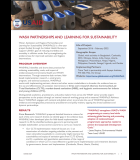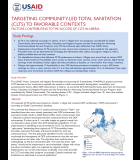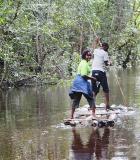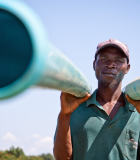Liberia Agricultural Upgrading, Nutrition & Child Health (LAUNCH)
Devastated by a 14-year civil war, the Liberian government established a peace accord and transition toward a democratic government in 2003. The nation has now undergone five years of peace building and reconstruction, investing in roads, schools, hospitals and clinics, educational facilities, electrical power supply, and other essential physical infrastructure that was destroyed or severely damaged during the war. While considerable strides have been made in rebuilding the nation, progress remains slow and the lack of access to basic infrastructure such as electricity, fuel supply, and communications, particularly in the rural areas where this study was carried out, is quite acute and pronounced.
It is in this context of extreme poverty and the urgent need to assist the Liberian population in moving from relief and recovery to a sustainable integrated development strategy that addresses a three-pronged approach in reducing levels of food insecurity among the most vulnerable segments of the population. USAID funded the LAUNCH partnership proposed to bolster human and institutional capacity in three core areas of development activity.
Activity Description
LAUNCH worked with smallholders to sustainably improve production practices, increase farm management skills, build resilience, and expand economic opportunities through a value chain approach. The health and nutrition strategy focused on the prevention of malnutrition, the early identification and treatment of acute malnutrition to prevent further deterioration of health/nutritional status, and the promotion of high-impact health and nutrition interventions at household, community and facility levels. Households receiving supplementary food rations were targeted for inclusion in the agricultural and livelihoods activities. The ration had been carefully designed to reduce malnutrition without creating beneficiary dependencies and undermining a market approach. Education activities developed community capacities to support education and increase access by youth to livelihoods education that increased their employability.
The program repaired infrastructure; improved water, sanitation, and hygiene (WASH); taught farmers more efficient agricultural methods; and councils mothers on boosting child and maternal nutrition. Most importantly, it brought community members together to address some of their most dire development problems while fostering strength through deep-seated bonds. The project also created Community Water Committees to educate communities about latrine use, handwashing, and other hygiene issues and maintain water points. Parent-teacher associations focused on upgrading WASH in schools.
LAUNCH has helped form over 250 farmer groups, in which members are taught to better manage natural resources and sustainably boost yields. These trainings emphasized water conservation, with particular attention to the management of soil moisture during the dry season and for control of runoff during the rainy season.
Expected Outcomes
- Improved agricultural production and support of more diversified livelihoods and income generating activities (IGA)
- Nutritional assistance and supplementary feeding for pregnant or lactating women (PLW) and children under two years, and mobilization/training of community health volunteers and support staff in rural health clinics
- Improved access to primary and secondary education and vocational training opportunities among unemployed rural youth.
Actual Outcomes
- The program has created 260 demonstration plots so farmers can practice and perfect the new techniques together, before adopting them on their individual farms.
- LAUNCH built or repaired 120 wells and building; institutional latrines in clinics and schools.





